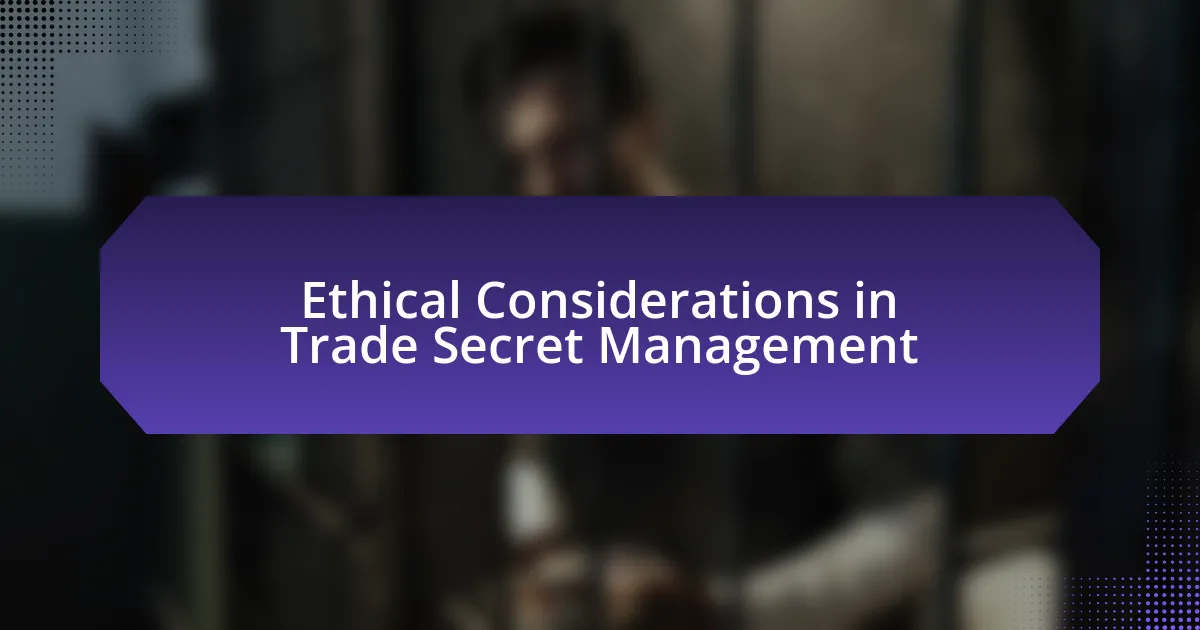The article focuses on ethical considerations in trade secret management, emphasizing the importance of protecting confidential information while promoting fair competition and transparency. It outlines the ethical dilemmas companies face, such as balancing confidentiality with innovation and the implications of misappropriating trade secrets. The article also discusses the role of laws and regulations, best practices for ethical management, and the impact of ethical behavior on stakeholder relationships, including employees, partners, and clients. Additionally, it highlights the significance of leadership in fostering an ethical culture and the use of technology to safeguard trade secrets effectively.

What are Ethical Considerations in Trade Secret Management?
Ethical considerations in trade secret management include the obligation to protect confidential information while ensuring fair competition and transparency. Companies must balance the need to safeguard proprietary information with ethical practices that prevent deception or exploitation of competitors. For instance, the Uniform Trade Secrets Act emphasizes the importance of reasonable efforts to maintain secrecy, which aligns with ethical standards in business conduct. Additionally, ethical dilemmas may arise when employees transition between companies, as they must navigate the boundaries of using knowledge gained from previous employers without infringing on trade secrets. This ethical framework is crucial for fostering trust and integrity in business relationships.
Why are ethical considerations important in trade secret management?
Ethical considerations are crucial in trade secret management because they ensure fair competition and protect the integrity of business practices. When companies adhere to ethical standards, they foster trust among stakeholders, including employees, customers, and partners. This trust is essential for maintaining a positive reputation and long-term success. Furthermore, ethical management of trade secrets helps prevent legal disputes and potential penalties associated with misappropriation or breach of confidentiality. For instance, the Uniform Trade Secrets Act emphasizes the importance of ethical behavior in safeguarding proprietary information, highlighting that ethical lapses can lead to significant financial and reputational damage.
How do ethical considerations impact business practices?
Ethical considerations significantly impact business practices by shaping decision-making processes and influencing corporate reputation. Businesses that prioritize ethical standards often experience enhanced trust from consumers and stakeholders, leading to increased loyalty and long-term success. For instance, a 2020 study by the Ethics & Compliance Initiative found that organizations with strong ethical cultures reported 50% fewer incidents of misconduct compared to those with weaker ethical frameworks. This demonstrates that ethical considerations not only guide behavior but also contribute to a more sustainable and profitable business model.
What role do ethics play in maintaining competitive advantage?
Ethics play a crucial role in maintaining competitive advantage by fostering trust and loyalty among stakeholders, including customers, employees, and investors. Companies that adhere to ethical practices are more likely to build strong relationships, which can lead to increased customer retention and employee satisfaction. For instance, a study by the Ethics & Compliance Initiative found that organizations with strong ethical cultures experience 50% lower employee turnover, enhancing their competitive position. Furthermore, ethical behavior can mitigate risks associated with legal issues and reputational damage, allowing companies to operate more effectively in their markets. This alignment of ethical standards with business practices not only differentiates a company from its competitors but also contributes to long-term sustainability and profitability.
What are the key ethical dilemmas in trade secret management?
Key ethical dilemmas in trade secret management include balancing the protection of proprietary information with the obligation to foster innovation and competition. Companies often face the challenge of ensuring that their trade secrets are not disclosed while also promoting transparency and ethical practices among employees. For instance, the misappropriation of trade secrets can lead to legal repercussions, as seen in cases like E.I. du Pont de Nemours and Company v. Kolon Industries, where the court ruled against Kolon for stealing trade secrets, highlighting the importance of ethical conduct in safeguarding intellectual property. Additionally, the ethical implications of non-disclosure agreements can create conflicts when employees transition to competitors, raising questions about the fairness of restricting their future employment opportunities.
How can companies balance confidentiality with transparency?
Companies can balance confidentiality with transparency by implementing clear policies that define what information is confidential and what can be shared publicly. This approach allows organizations to protect sensitive data while fostering trust with stakeholders. For instance, companies can adopt a tiered information-sharing model, where only non-sensitive information is disclosed to the public, while critical trade secrets remain protected. Research indicates that 70% of employees feel more engaged when they understand company transparency policies, which can enhance overall morale and productivity. By establishing guidelines that delineate the boundaries of confidentiality and transparency, companies can effectively manage ethical considerations in trade secret management.
What are the implications of misappropriating trade secrets?
Misappropriating trade secrets can lead to severe legal and financial consequences for the offending party. Legal implications include civil lawsuits, where the trade secret owner can seek damages, which may include lost profits and punitive damages, as seen in cases like E.I. du Pont de Nemours and Company v. Christopher, where the court awarded significant damages for trade secret theft. Additionally, criminal charges may arise, resulting in fines and imprisonment under the Economic Espionage Act of 1996, which criminalizes the theft of trade secrets for commercial advantage. Financially, companies may face loss of competitive advantage, increased costs for litigation, and potential damage to their reputation, which can deter customers and investors. Overall, the implications of misappropriating trade secrets encompass legal repercussions, financial losses, and reputational harm.
How do laws and regulations influence ethical trade secret management?
Laws and regulations significantly influence ethical trade secret management by establishing legal frameworks that protect confidential business information. These legal protections, such as the Uniform Trade Secrets Act in the United States, define what constitutes a trade secret and outline the necessary steps for businesses to take in order to safeguard their proprietary information. Compliance with these laws ensures that companies implement ethical practices, such as maintaining confidentiality agreements and conducting employee training on information security. Furthermore, violations of trade secret laws can lead to legal repercussions, reinforcing the importance of ethical management practices to avoid litigation and reputational damage.
What legal frameworks govern trade secret protection?
The legal frameworks governing trade secret protection primarily include the Uniform Trade Secrets Act (UTSA) and the Defend Trade Secrets Act (DTSA) in the United States. The UTSA, adopted by most states, provides a definition of trade secrets and outlines the legal remedies available for misappropriation. The DTSA, enacted in 2016, allows for federal jurisdiction in trade secret cases and provides for civil remedies, including injunctions and damages. These frameworks establish the criteria for what constitutes a trade secret, the obligations of parties to maintain secrecy, and the legal recourse available in cases of misappropriation.
How do compliance requirements shape ethical practices?
Compliance requirements shape ethical practices by establishing a framework that organizations must follow to ensure lawful and responsible behavior. These requirements often include regulations such as the Sarbanes-Oxley Act, which mandates transparency and accountability in financial reporting, thereby promoting ethical conduct among businesses. By adhering to compliance standards, companies are compelled to implement policies and training that foster ethical decision-making, reduce risks of misconduct, and enhance corporate governance. For instance, organizations that comply with the General Data Protection Regulation (GDPR) not only protect consumer data but also cultivate a culture of respect for privacy, which aligns with ethical business practices.
What best practices can organizations adopt for ethical trade secret management?
Organizations can adopt several best practices for ethical trade secret management, including implementing robust confidentiality agreements, conducting regular training on trade secret protection, and establishing clear policies for information access. Confidentiality agreements ensure that employees and partners understand their obligations regarding sensitive information, while training programs raise awareness about the importance of safeguarding trade secrets. Additionally, clear policies help delineate who can access trade secrets and under what circumstances, reducing the risk of unauthorized disclosure. These practices are supported by the Uniform Trade Secrets Act, which emphasizes the need for reasonable efforts to maintain the secrecy of trade secrets, thereby reinforcing the ethical obligation to protect proprietary information.
How can companies create a culture of ethics around trade secrets?
Companies can create a culture of ethics around trade secrets by implementing comprehensive training programs that emphasize the importance of confidentiality and ethical behavior. These programs should educate employees about the legal implications of trade secrets and the potential consequences of breaches, fostering a sense of responsibility. Additionally, establishing clear policies and procedures for handling trade secrets, along with regular audits and assessments, reinforces the commitment to ethical practices. Research indicates that organizations with strong ethical cultures experience fewer incidents of misconduct, as employees are more likely to adhere to ethical guidelines when they are clearly communicated and enforced.
What training and policies are essential for ethical management?
Essential training for ethical management includes ethics training programs that educate employees on ethical decision-making, compliance with laws, and company values. Policies that are crucial encompass a code of conduct, confidentiality agreements, and guidelines for reporting unethical behavior. These elements ensure that employees understand the importance of ethical practices, particularly in sensitive areas like trade secret management, where adherence to ethical standards protects both the organization and its intellectual property. Research indicates that organizations with robust ethics training and clear policies experience fewer ethical violations and foster a culture of integrity.

How can ethical considerations affect stakeholder relationships?
Ethical considerations significantly impact stakeholder relationships by fostering trust and transparency. When organizations prioritize ethical practices, stakeholders, including employees, customers, and investors, are more likely to engage positively, leading to enhanced collaboration and loyalty. For instance, a study by the Ethics & Compliance Initiative found that organizations with strong ethical cultures experience 50% lower employee turnover, indicating that ethical behavior directly correlates with stakeholder satisfaction and retention. Furthermore, ethical considerations in trade secret management, such as respecting confidentiality and fair competition, can prevent legal disputes and enhance a company’s reputation, thereby strengthening stakeholder relationships.
What is the impact of ethical trade secret management on employees?
Ethical trade secret management positively impacts employees by fostering a culture of trust and respect within the organization. When companies prioritize ethical practices in handling trade secrets, employees feel secure in their roles, knowing that their contributions and proprietary information are protected. This sense of security enhances employee morale and loyalty, leading to increased productivity and reduced turnover rates. Research indicates that organizations with strong ethical standards experience higher employee engagement, as workers are more likely to align with a company that values integrity and transparency.
How does transparency influence employee trust and morale?
Transparency significantly enhances employee trust and morale by fostering an environment of openness and accountability. When organizations communicate clearly about their goals, challenges, and decision-making processes, employees feel valued and included, which strengthens their commitment to the company. Research from the Harvard Business Review indicates that companies with high transparency levels experience 30% higher employee engagement and satisfaction rates. This correlation suggests that transparency not only builds trust but also positively impacts overall morale, leading to improved productivity and retention rates.
What are the consequences of unethical practices on employee retention?
Unethical practices significantly decrease employee retention by fostering a toxic work environment and eroding trust. When employees perceive unethical behavior, such as dishonesty or unfair treatment, they are more likely to disengage and seek employment elsewhere. Research indicates that organizations with high ethical standards experience 55% lower turnover rates compared to those with poor ethical practices. This correlation highlights that maintaining ethical conduct is crucial for retaining talent and ensuring organizational stability.
How do ethical considerations affect relationships with partners and clients?
Ethical considerations significantly influence relationships with partners and clients by establishing trust and fostering transparency. When organizations prioritize ethical behavior, they create an environment where partners and clients feel secure in their dealings, leading to stronger collaborations. For instance, a study by the Ethics & Compliance Initiative found that organizations with strong ethical cultures experience 50% fewer instances of misconduct, which directly correlates with improved partner and client relationships. This trust enhances communication and encourages long-term partnerships, as stakeholders are more likely to engage with entities that demonstrate integrity and accountability in their practices.
What role does trust play in business partnerships?
Trust is fundamental in business partnerships as it fosters collaboration, enhances communication, and mitigates risks. When partners trust each other, they are more likely to share sensitive information, including trade secrets, which is crucial for innovation and competitive advantage. Research indicates that high levels of trust can lead to increased commitment and satisfaction among partners, ultimately resulting in better performance and long-term success. For instance, a study published in the Journal of Business Research found that trust significantly influences the effectiveness of partnerships, leading to improved outcomes in joint ventures and alliances.
How can ethical trade secret management enhance client relationships?
Ethical trade secret management enhances client relationships by fostering trust and transparency. When businesses prioritize ethical practices in handling trade secrets, clients feel more secure that their sensitive information is protected, leading to stronger partnerships. For instance, a study by the International Association of Privacy Professionals found that 85% of consumers are more likely to engage with companies that demonstrate a commitment to ethical data management. This trust not only improves client satisfaction but also encourages long-term loyalty, as clients are more inclined to continue working with organizations that respect their confidentiality and uphold ethical standards.

What are the challenges in implementing ethical trade secret management?
The challenges in implementing ethical trade secret management include balancing confidentiality with transparency, ensuring compliance with legal standards, and addressing employee awareness and training. Organizations must navigate the tension between protecting proprietary information and fostering an open culture that encourages innovation. Legal compliance is critical, as mismanagement can lead to litigation or regulatory penalties; for instance, the Defend Trade Secrets Act of 2016 emphasizes the need for clear policies. Additionally, employee training is essential, as a lack of understanding about what constitutes a trade secret can lead to unintentional disclosures, impacting the organization’s competitive edge.
What obstacles do organizations face in maintaining ethical standards?
Organizations face several obstacles in maintaining ethical standards, including conflicting interests, lack of clear guidelines, and pressure to achieve financial results. Conflicting interests arise when personal or departmental goals clash with ethical practices, leading to compromised decision-making. The absence of clear guidelines can create ambiguity, making it difficult for employees to understand what constitutes ethical behavior. Additionally, organizations often experience pressure to prioritize financial performance over ethical considerations, which can result in unethical practices being overlooked or justified. These challenges highlight the complexity of upholding ethical standards in a competitive business environment.
How can companies address conflicts of interest?
Companies can address conflicts of interest by implementing clear policies and procedures that promote transparency and accountability. Establishing a code of ethics that outlines acceptable behaviors and potential conflicts helps employees recognize and report issues. Regular training sessions on ethical decision-making reinforce the importance of integrity in business practices. Additionally, companies can create a reporting mechanism, such as an anonymous hotline, to encourage employees to disclose conflicts without fear of retaliation. Research shows that organizations with strong ethical cultures experience fewer conflicts of interest, leading to improved trust and collaboration among employees.
What strategies can mitigate risks of unethical behavior?
Implementing a robust code of ethics is a primary strategy to mitigate risks of unethical behavior. A well-defined code establishes clear expectations for conduct, guiding employees in decision-making processes. Research indicates that organizations with a strong ethical framework experience lower instances of misconduct; for example, a study by the Ethics & Compliance Initiative found that 70% of employees in organizations with effective ethics programs reported a positive ethical culture. Additionally, regular ethics training reinforces these standards, ensuring employees understand the implications of their actions and the importance of ethical behavior in trade secret management.
How can technology aid in ethical trade secret management?
Technology aids in ethical trade secret management by providing secure data storage, access controls, and monitoring systems. Secure data storage solutions, such as encryption and cloud services, protect sensitive information from unauthorized access, ensuring that trade secrets remain confidential. Access controls allow organizations to limit who can view or modify trade secrets, thereby reducing the risk of internal breaches. Monitoring systems can track access and usage of trade secrets, enabling companies to detect and respond to potential ethical violations promptly. For instance, a study by the Ponemon Institute found that organizations using advanced security technologies experienced 50% fewer data breaches, highlighting the effectiveness of technology in safeguarding trade secrets.
What tools are available for protecting trade secrets ethically?
Legal agreements, such as non-disclosure agreements (NDAs) and non-compete clauses, are essential tools for protecting trade secrets ethically. NDAs legally bind employees and partners to confidentiality, ensuring that sensitive information remains undisclosed. Non-compete clauses prevent individuals from using proprietary knowledge to benefit competitors after leaving a company. Additionally, implementing robust internal policies and training programs on information security fosters a culture of respect for trade secrets. These measures are supported by legal frameworks, such as the Uniform Trade Secrets Act in the United States, which provides a basis for legal recourse in cases of misappropriation.
How can data security measures align with ethical practices?
Data security measures can align with ethical practices by ensuring the protection of sensitive information while respecting individuals’ privacy rights. Implementing robust encryption, access controls, and regular audits not only safeguards trade secrets but also demonstrates a commitment to ethical standards, as outlined in frameworks like the General Data Protection Regulation (GDPR). The GDPR mandates that organizations handle personal data responsibly, which reinforces the ethical obligation to protect data from unauthorized access and breaches. By adhering to these security protocols, companies can maintain trust with stakeholders and comply with legal requirements, thereby aligning their data security efforts with ethical practices.
What practical steps can organizations take to ensure ethical trade secret management?
Organizations can ensure ethical trade secret management by implementing robust confidentiality agreements and conducting regular training for employees on the importance of protecting sensitive information. Confidentiality agreements legally bind employees to safeguard trade secrets, thereby reducing the risk of unauthorized disclosure. Regular training sessions reinforce the significance of ethical practices and educate employees on the legal implications of mishandling trade secrets. Additionally, organizations should establish clear policies outlining the handling, storage, and sharing of trade secrets, ensuring that all employees understand their responsibilities. These steps are supported by the Uniform Trade Secrets Act, which provides a legal framework for the protection of trade secrets, emphasizing the necessity of ethical management practices.
How can regular audits improve ethical compliance?
Regular audits can significantly improve ethical compliance by systematically identifying and addressing potential ethical breaches within an organization. These audits provide a structured approach to evaluate adherence to ethical standards and regulations, ensuring that employees understand and follow established guidelines. For instance, a study by the Ethics & Compliance Initiative found that organizations with regular audits reported a 30% increase in ethical behavior among employees, highlighting the effectiveness of this practice in reinforcing ethical norms. By regularly assessing compliance, organizations can proactively mitigate risks, enhance accountability, and foster a culture of integrity.
What role does leadership play in fostering ethical trade secret management?
Leadership plays a crucial role in fostering ethical trade secret management by establishing a culture of integrity and accountability within an organization. Effective leaders set clear expectations regarding the ethical handling of trade secrets, ensuring that employees understand the importance of confidentiality and compliance with legal standards. For instance, a study by the Ethics & Compliance Initiative found that organizations with strong ethical leadership are 3.5 times more likely to have employees who report ethical misconduct, highlighting the impact of leadership on ethical behavior. By modeling ethical decision-making and providing training on trade secret protection, leaders reinforce the significance of safeguarding proprietary information, ultimately promoting a responsible organizational environment.



